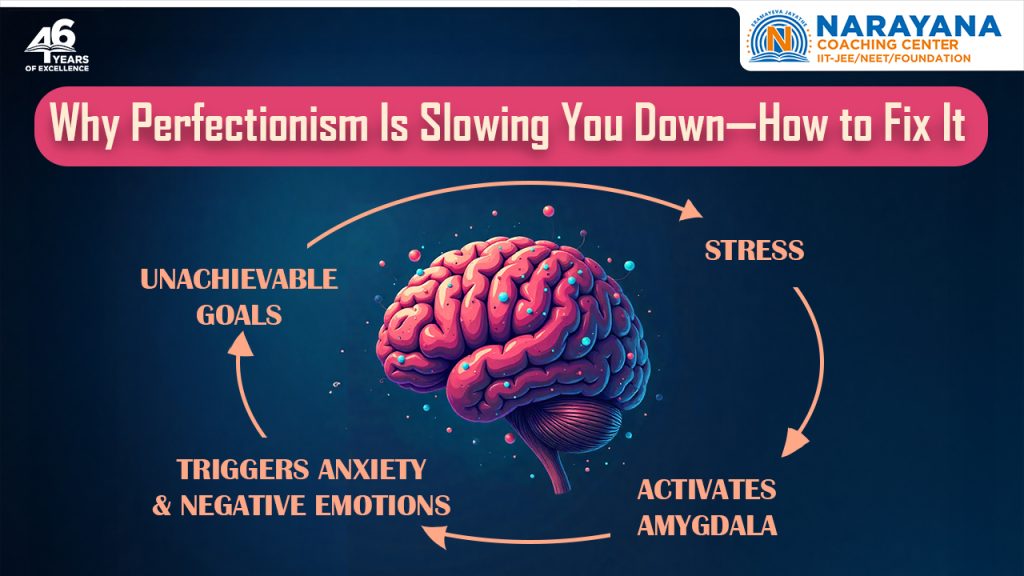
Have you ever spent hours rewriting an essay because it “wasn’t good enough”? Or maybe you keep putting off a big project because you’re afraid it won’t be perfect. If that sounds familiar, you may be dealing with perfectionism.
Perfectionism is the belief that everything you do must be flawless—and that mistakes are unacceptable. It might sound like a good thing at first, but here’s the truth: perfectionism slows you down, stresses you out, and stops you from growing.
In this article, we’ll explain why perfectionism holds you back and share practical ways to overcome it. Whether you’re in 8th grade or a high school senior, these tools will help you become more confident, productive, and balanced.
📉 What Is Perfectionism—and Why Is It a Problem?
Perfectionism is more than just “trying your best”. It’s the belief that anything less than perfect is a failure. Perfectionists often:
- Procrastinate because they fear making mistakes
- Spending too long on tasks
- Avoid challenges they might not win
- Feel anxious or embarrassed when things aren’t flawless
At school, this might mean rewriting an essay five times, not turning in a project because it’s “not ready”, or avoiding clubs or sports unless you’re already skilled at them.
The problem? Perfectionism makes you focus more on avoiding failure than on learning or growing. It trains your brain to fear mistakes instead of using them to improve.
🚫 How Perfectionism Slows You Down
Let’s look at the specific ways perfectionism can hurt your progress.
1. You Procrastinate More
Many perfectionists delay starting tasks because starting means facing the risk of doing something “wrong”. You might wait until the last minute, hoping for the “perfect moment” to begin—but it rarely comes.
Reality check: There’s no such thing as a perfect time. Starting now, even if it’s messy, is always better.
2. You Waste Time on Tiny Details
Ever spent 20 minutes choosing a font or rewriting the same sentence? Perfectionists often lose hours on things that don’t really matter in the bigger picture.
Tip: Ask yourself, ‘Is this detail important enough to keep fixing, or am I just stalling?’
3. You Miss Opportunities
Perfectionism can stop you from trying new things—joining debate club, trying out for soccer, or applying to a summer programme—because you’re afraid of not being the best.
But here’s the truth: Growth comes from trying, failing, and learning—not from waiting until you’re perfect.
4. It Increases Anxiety and Lowers Confidence
When you believe everything has to be perfect, you’re always under pressure. Even small mistakes feel overwhelming. Over time, that pressure builds into stress, burnout, and low self-esteem.
🧠 Where Does Perfectionism Come From?
Perfectionism often starts with good intentions. Maybe you want to do well in school, make your parents proud, or feel in control. But it can also be influenced by:
- Fear of failure
- Comparing yourself to others (especially through social media)
- Pressure from school, family, or yourself
- Believing your self-worth depends on your achievements
Understanding where perfectionism comes from is the first step toward overcoming it.
🛠️ How to Overcome Perfectionism (and Still Succeed)
Here’s the good news: You can still care about doing well without being a perfectionist. It starts with shifting your mindset and using tools to work smarter, not harder.
1. Focus on Progress, Not Perfection
Instead of aiming for a perfect final result, aim for improvement. Ask yourself:
“Am I better than I was yesterday?”
“What did I learn while doing this?”
Growth matters more than perfection.
2. Set Realistic Goals
Break big tasks into smaller, manageable steps. Instead of saying, “I need to write the best essay ever,” try:
“Today, I’ll write the introduction. Tomorrow, I’ll draft two paragraphs.”
This approach helps you get started and prevents overwhelm.
3. Practice Self-Compassion
Mistakes aren’t signs of failure—they’re signs of effort. Talk to yourself like you would talk to a friend. Would you call your best friend a “failure” for earning a B+ or making a small mistake? No—and you shouldn’t call yourself one either.
4. Use a Time Limit
Set a timer when working on assignments. When it goes off, stop and move on. This helps you avoid over-editing and trains your brain to value completion over perfection.
5. Celebrate Effort
You don’t need a perfect grade to feel proud. Celebrate when you try something new, finish a tough project, or take a risk. Success is showing up and trying—not just winning.
🧭 Final Thoughts
Perfectionism might feel like a strength, but it often slows you down and holds you back. The truth is, nobody is perfect—and that’s okay. Real growth happens when you make mistakes, learn, and keep moving.
So the next time you feel stuck because things aren’t “good enough,” remember: done is better than perfect, and progress beats perfection.
Start small. Start messy. Just start.
✅ Quick Recap
| Problem | Why It Happens | How to Overcome It |
| Procrastination | Fear of failure | Break tasks into steps |
| Over-editing | Fear of being wrong | Set time limits |
| Missed opportunities | Fear of imperfection | Try new things, even if you’re not ready |
| Stress & anxiety | Unrealistic expectations | Practice self-compassion |
If you’re ready to stop letting perfectionism hold you back, take the first step today—finish something, even if it isn’t perfect. You’ll be surprised at how far that takes you.
